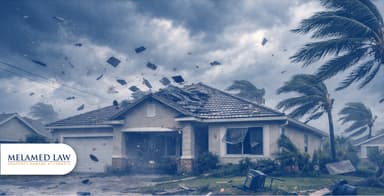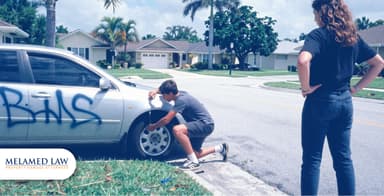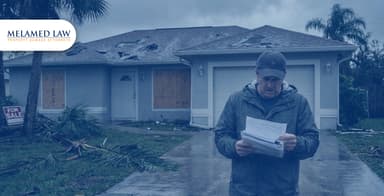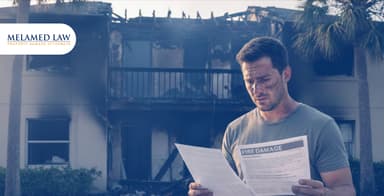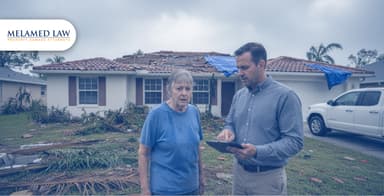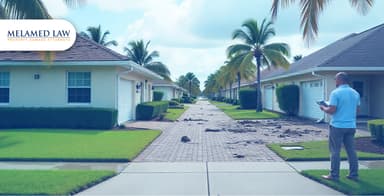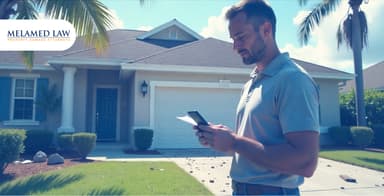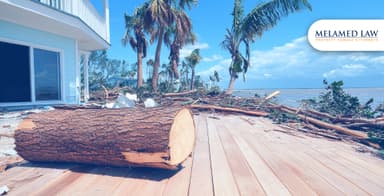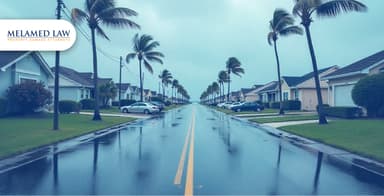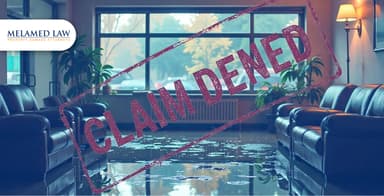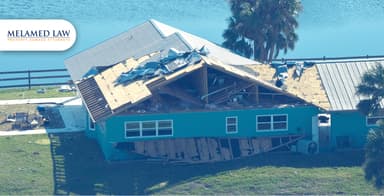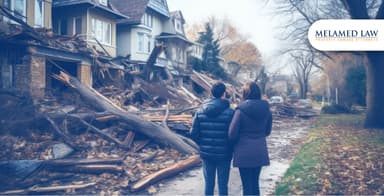
How to Recover Depreciation Costs from Insurance Claims in Florida
When the unexpected happens, we help individuals and businesses collect the money they deserve for their insurance claims.
Melamed Blogs
July 12, 2025
How to Recover Depreciation Costs from Insurance Claims in Florida

Did you know Florida homeowners filed over 800,000 property insurance claims; however, millions in recoverable depreciation went unclaimed because policyholders weren’t told how or that they had a right to get it back? You did everything right. You paid your premiums. You protected your home. And when disaster struck—whether it was a hurricane, a burst pipe, or a collapsed roof— you filed a claim, expecting your insurance company to deliver on its promise.
However, when the check arrived, it was lower than expected. Somewhere in the breakdown, you noticed a deduction labeled “depreciation.” No clear explanation. No next steps. Just money withheld from what you thought you were owed.
And here’s what most insurance companies won’t tell you: That missing money? It’s not always gone for good. You just have to know how to fight for it… and who to call when your insurance company won’t budge.
1) What Is Depreciation, and Why Is It Withheld from Your Insurance Payout?
When you file a property damage claim, your insurance company often sends a payment that’s lower than the cost to repair or replace what you lost. The reason? They’re deducting depreciation—the estimated loss in value due to age, wear and tear, or outdated materials.
Here’s how it usually works. Let’s say your roof was 15 years old before it was damaged in a storm. Even if your policy covers the full replacement cost, your insurance company may initially pay you only the Actual Cash Value (ACV), the current market value of that old roof, not the cost to install a new one. The difference between the ACV and the Replacement Cost Value (RCV) is withheld as recoverable depreciation.
In fact, more than 60% of Florida homeowners have replacement cost coverage, but many don’t realize that depreciation can be reclaimed after repairs are completed.
Source: Florida Office of Insurance Regulation
The frustrating part? Insurance companies rarely explain this clearly. Homeowners often assume that the lower payment is final, walking away from thousands they could’ve recovered.
However, in many cases, once repairs are completed and proper documentation is submitted, you have the right to recover that withheld amount. That’s money you’re contractually entitled to, only if you take the right steps before the deadline.
So, how do you know if your depreciation is recoverable or if your insurance company is hoping you won’t ask? Let’s clear that up next.
Only 41% of homeowners understand the difference between ACV and RCV coverage, leaving many unsure whether they’re eligible to recover depreciation at all.
Source: Insurance Information Institute, 2023 Survey
If your policy includes Replacement Cost Value (RCV) coverage, you likely qualify for depreciation recovery. But even then, strict timelines often apply, and some insurance companies require notice within months of the loss or completion of repairs. Miss that window, and you could lose the right to claim what’s rightfully yours.
That’s why it helps to have someone who knows how to read between the lines and hold insurance companies accountable when they don’t follow their policy language.
2) Why Insurance Companies Withhold Depreciation and How It Affects You
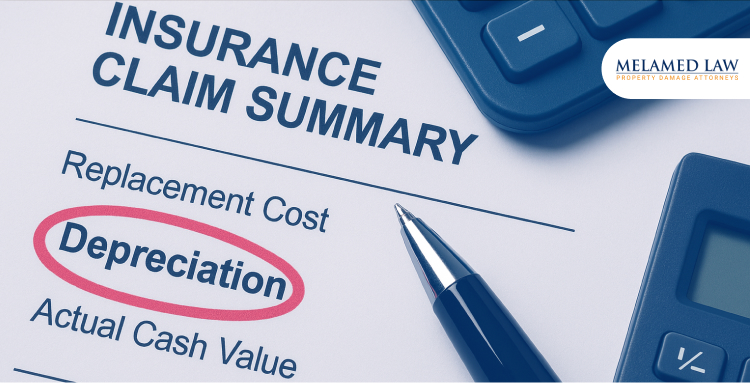
Behind the numbers is a strategy, and it’s not always in your favor. Insurance companies argue that withholding depreciation is standard business practice. They claim it protects against overpayment in case repairs aren't completed or the property isn’t restored to its original value.
However, here’s what they often leave out: many Florida homeowners don’t know this money is recoverable, even when it is. That lack of transparency works in the insurance company’s favor and can quietly save them thousands on every claim.
When you don’t reclaim that depreciation, you’re not just losing a line item on a statement. You’re often absorbing the cost of new materials, updated labor, and full restoration, all out of pocket. And for many families, that financial burden lingers long after the storm has passed.
In 2023, Florida homeowners paid an average of $3,800 out of pocket per storm-related claim, even when insured.
Source: Insurance Research Council, 2023 Report
The truth? That withheld money might belong to you. But unless you act, it will remain in the insurance company’s pocket, not in the restoration of your home.
And if they’ve already denied your depreciation recovery or refused to respond, don’t walk away quietly. You may have more power—and more options—than you think. More for you: When to Seek Legal Help for Wind Damage Insurance Claims
3) Melamed Law Helps You Take the Right Action Before it’s Too Late
Recovering depreciation isn’t automatic. Even if your policy includes Replacement Cost Value (RCV) coverage, insurance companies won’t release the withheld funds unless you follow their process to the letter. Miss a step or a deadline, and they may legally refuse to pay.
Steps Florida Homeowners Shouldn’t Skip :
Complete all repairs related to the original claim.
Save and submit invoices, receipts, and proof of completed work.
Request the release of recoverable depreciation in writing, with supporting documents.
Meet your policy’s deadline.
Sound overwhelming? That’s because it often is, especially when your insurance company delays, disputes your costs, or buries you in paperwork. We don’t just help you recover depreciation—we hold your insurance company accountable when they fail to pay what they owe. From policy review to direct negotiations, our attorneys make sure your claim is handled lawfully and without delay.
In 2022, the Florida Department of Financial Services received over 15,000 consumer complaints related to underpaid or mishandled property insurance claims.
Source: Florida Department of Financial Services Annual Report
If you’ve completed repairs and your insurance company still hasn’t paid the full amount, you may have a legal case for bad faith conduct or breach of contract, and we’ll help you build it. [Must Read: What to Do If Your Insurance Claim is Taking Too Long in Florida]
4) Why Florida Homeowners Trust Melamed Law to Recover Withheld Depreciation

Your insurance company has a team, and so should you. When insurers delay or shortchange depreciation payouts, it’s not just frustrating—it’s often by design. With adjusters, in-house lawyers, and claims analysts all working to minimize their liability, you need legal professionals who know how to push back.
We represent homeowners throughout Florida who have been underpaid or wrongfully denied depreciation funds. We understand the complexities of insurance language, the importance of deadlines, and the tactics insurers use to avoid paying in full.
Here’s what sets us apart:
Focused experience in property damage and insurance law across Florida
Hands-on support from real attorneys—no call centers, no delays
A fierce investigation of underpaid and wrongfully denied depreciation claims
You paid for full coverage. You deserve the full payout. If your insurer is holding back depreciation you’re rightfully owed, we’ll take over and fight for your financial recovery.
5) Let Our Attorneys Handle the Stress While You Focus on Rebuilding
Dealing with insurance companies after property damage is overwhelming enough. Add in confusing paperwork, tight deadlines, and the fight to recover withheld depreciation, and it can feel impossible. That’s why Melamed Law steps in to take the burden off your shoulders.
Here’s how we help:
Thoroughly review your insurance policy to identify your exact rights and coverage.
Manage all the necessary documentation and paperwork so nothing falls through the cracks.
Negotiate directly with your insurance company to recover every dollar of depreciation owed to you.
Pursue full settlement—including attorney’s fees where the law allows— ensuring you don’t pay more to get what’s rightfully yours.
Let Us Fight for the Full Value of Your Insurance Claim

You don’t have to settle for partial payments. Recovering your full replacement cost can make a significant difference—not just financially, but in how quickly you’re able to rebuild and move forward.
If your insurer is delaying or denying the depreciation you’re owed, time is critical. Florida policies often have strict deadlines, and once they pass, your claim may be closed for good.
Contact Melamed Law today for a free, no-obligation consultation. Let us review your claim, answer your questions, and start fighting for the full value of your insurance payout because you deserve nothing less.
Recent Cases


